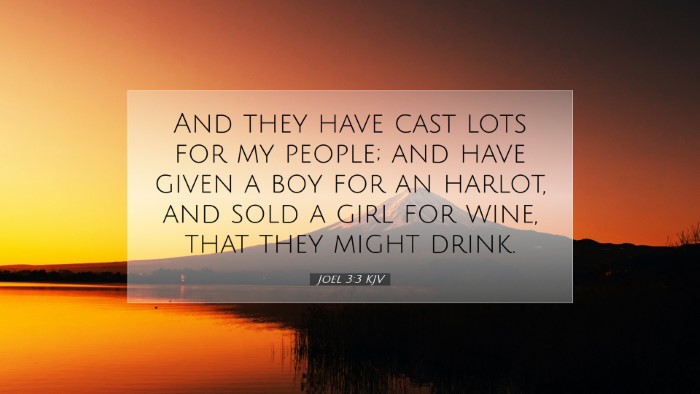Old Testament
Genesis Exodus Leviticus Numbers Deuteronomy Joshua Judges Ruth 1 Samuel 2 Samuel 1 Kings 2 Kings 1 Chronicles 2 Chronicles Ezra Nehemiah Esther Job Psalms Proverbs Ecclesiastes Song of Solomon Isaiah Jeremiah Lamentations Ezekiel Daniel Hosea Joel Amos Obadiah Jonah Micah Nahum Habakkuk Zephaniah Haggai Zechariah MalachiJoel 3:3
Joel 3:3 KJV
And they have cast lots for my people; and have given a boy for an harlot, and sold a girl for wine, that they might drink.
Joel 3:3 Bible Commentary
Commentary on Joel 3:3
Joel 3:3 reads: "And they have cast lots for my people; and have given a boy for a harlot, and sold a girl for wine, that they might drink." This verse serves as a stark reminder of the moral depravity and exploitation that permeated society, which led to divine judgment. In this commentary, we will explore insights from notable public domain scholars: Matthew Henry, Albert Barnes, and Adam Clarke.
Contextual Background
The book of Joel is prophetic literature that addresses the people of Judah during a time of great calamity and forthcoming judgment. Joel prophesies not only the immediate locust plague but also a future outpouring of God's Spirit and the Day of the Lord—a theme prevalent throughout the Scriptures.
Exegesis of Joel 3:3
This verse specifically highlights the horrors of slavery and human trafficking, particularly in the context of war and conquest. Matthew Henry notes that the casting of lots signifies a loss of dignity and humanity, as the captors treat persons as mere commodities.
-
Human Exploitation:
Henry emphasizes that the people of Judah were not only subjected to physical captivity but were also dehumanized, illustrating the extreme moral collapse of the oppressors. This shows a complete disregard for the sanctity of human life.
-
Children Sold for Depravity:
Henry’s commentary indicates that the reference to a "boy for a harlot" and "a girl for wine" is indicative of how desperate the situation became, where innocence is bartered away for debauchery and indulgence.
Theological Implications
According to Albert Barnes, the text warns against the inevitable judgement that follows such societal decay. He contends this verse reveals God's righteous indignation against nations that take advantage of the weak.
-
Divine Justice:
Barnes stresses that just as nations can fall into depravity, so too will they face divine retribution. The severity of one’s sins is met with equally severe consequences.
-
Sacredness of Human Dignity:
He reflects on the disregard for human dignity that results from sin, underscoring the need for societal restoration through repentance and justice.
Societal Reflections
Adam Clarke extends the conversations around societal and spiritual decay that this verse represent. Clarke posits that the moral breakdown is often reflective of a community’s distance from God and its principles.
-
Indifference of Society:
Clarke notes that apathy towards the plight of the oppressed can lead to greater moral consequences, as seen in the acts described within the verse. This can serve as a broader commentary on social injustices in contemporary society.
-
Call to Action:
Clarke sees this verse as a prophetic call to action for the faithful—a reminder to advocate for justice and to reflect God's love and compassion in a world that can often seem indifferent.
Conclusion
Joel 3:3 serves not only as a historical document but as a theological and ethical admonition for all who read it today, beckoning believers to respond with both a somber acknowledgment of human depravity and a proactive approach to rectifying injustices. The insights from Henry, Barnes, and Clarke invite pastors, theologians, and scholars to examine the moral implications in their context and to be agents of change in a world marred by exploitation and vice.


